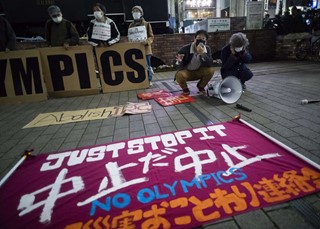Tokyo Olympics should not be held in 2021 under COVID's long shadow

May 3, SanFrancisco Chronicles
Eleven weeks. That’s approximately how long it is until the scheduled Opening Ceremonies for the Tokyo Olympics.
It’s simply not enough time.
When the Olympics were postponed by a year because of the pandemic sweeping the globe, the International Olympic Committee was buying time. Time for the coronavirus to be contained, time for a vaccine rollout, time for the fears and the disease to ebb.
And it turns out, it isn’t enough time. Not to safely hold the first post-pandemic global event. Because we’re not post-pandemic yet. Not even close.
Here in the United States, it might seem like a July Olympics could work. Our country is opening. Vaccines have been plentiful — a third of Americans are fully vaccinated. Many people are beginning to feel safe.
But that’s not the way it is around much of the rest of the world. And it is definitely not true in Japan.
Take a look at a current coronavirus map of the world. It is still ablaze in reds and bright oranges and not just in ravaged India. Parts of Europe, much of South America — all still awash in the virus. All of those countries are planning to send teams to the Olympics.
Japan, like many island nations, has done a relatively good job of controlling its borders and the virus. Scroll down the list of countries by cases and deaths and it take a while before you get to Japan. That’s good.
But scroll down the list of countries by vaccination rate and Japan is also near the bottom. That’s bad.
Japan has a long and complicated history with vaccinations and a low degree of “vaccine confidence.” Back in the early 1990s, a supposed link between the measles, mumps, rubella vaccine and a higher rate of aseptic meningitis led to the government not recommending the shot, which is a basic vaccination in the United States and much of the world. The Japanese government also doesn’t recommend the HPV vaccine, designed to prevent cervical cancer in women.
Combine that vaccine hesitancy with Japan’s conservative approach to regulatory approval of vaccinations, a factor in the country’s slow trajectory to approving and procuring COVID-19 vaccines, and the result is many barriers to getting shots into arms. Which is not good for a nation scheduled to host the first global event of the pandemic.
Despite having one of the oldest populations in the world — almost a third of the country is 65 or older — Japan has one of the world’s lowest vaccination rates. Only 2% of the population has received at least one dose of vaccine.
And though Japan has, as mentioned, done a relatively good job of controlling the virus, virus mutations are appearing and cases are on the rise. In just the past few days, the government has declared a targeted state of emergency in Tokyo, Osaka and other areas. The restrictive protocols will be in place until at least next Tuesday.
It does not seem like an ideal time to throw open the doors and hold what could be a superspreader event.
The Japanese public remains unwaveringly opposed to hosting the Olympics while the pandemic still rages. Polls consistently show that more than 70% are opposed. Though it has not yet been determined if domestic fans can buy tickets (no foreign spectators will be allowed), few Japanese seem interested in attending the Games. As the Olympic torch makes its way through the country, torch runners have been heckled by frustrated onlookers.
Sure, Japan already has spent an enormous amount of money on the Olympics, which a revised estimate put at a record-setting price tag of $15.4 billion. But if the pandemic should have taught us anything, it is that you can’t place economic priorities ahead of health. That strategy backfires.



